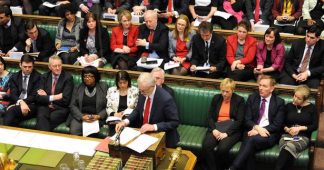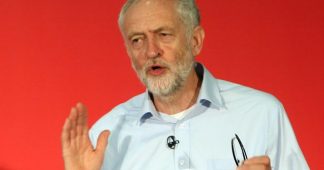BEN CHACKO writes on the dangers of the Labour right and why we need to turn the party’s mass membership into a mass movement
AS THE labour movement gathers for TUC 2016 much of the optimism of last year’s conference has evaporated.
Then Jeremy Corbyn had just been elected with an overwhelming mandate to shift Labour leftwards and mount a socialist challenge to a tired and discredited Establishment.
Now, less than a year on, he’s in the middle of another leadership race, the result of a revolt by his own MPs.
If that makes us gloomy, it’s not because his challenger Owen Smith seems likely to unseat him. Analysts of left and right are agreed that Corbyn will probably emerge the victor later this month.
It’s what happens next that worries so many of us. British politics is in a turbulent state, but if there’s a defining characteristic of the current age, it’s the weakness of political forces on all sides.
The government is weak: the Conservatives cling to a wafer-thin majority in Parliament. David Cameron’s mandate was weak, holding on to Number 10 with the support of less than one in four eligible voters — a result that proves the urgency of electoral reform.
Theresa May’s mandate is weaker still, since she was never elected to the office she holds. And her administration is adrift, split down the middle over how to deal with the unexpected vote to leave the European Union, clueless on industrial policy, uncertain where it stands on everything from nuclear power stations to prison reform.
Much of the anger ordinary Labour Party members and trade unionists have directed at Labour MPs is due to the government’s weakness: to declare an internal civil war at such a time seems shockingly self-indulgent.
It’s easier to understand if we acknowledge that Corbyn is far more dangerous than the Tories in the eyes of the Labour right.
To MPs who are as wedded to the Establishment and the status quo as the Conservatives are, a popular leader who can rally hundreds of thousands of people in the cause of socialism is a mortal threat.
That’s what the revolt is about and that’s why the left has to defeat it. The personal qualities of Corbyn and Smith are secondary, though the latter’s conversion to radical socialism seems opportunistic.
But Smith’s victory would be a victory of the Parliamentary Labour Party over the members and the unions.
It was no accident that, in the early days of the “chicken coup,” shadow cabinet deserter Lucy Powell told the affiliated trade unions to leave the question of who leads the party to Labour members — as if the unions were not an integral part of the party.
A Smith victory would see the concerns of trade unionists brushed aside as the party elite resume their cosy relationship with big business.
The astonishingly draconian steps the party machine has taken to reduce the chance of Corbyn winning are another warning sign. Disenfranchising 130,000 members and purging people left, right and centre — including the general secretary of an affiliated union — is not the behaviour of an establishment that cares about playing fair.
And hints from deputy leader Tom Watson and others make it clear that if Corbyn is defeated, the PLP will not allow socialists a second chance. The leadership election rules will be changed so the members never again get the opportunity to upset the apple cart.
Fortunately, the Labour right is weak too. It has not even begun to recover from its comprehensive drubbing at last year’s leadership election.
Bereft of ideas and unable to comprehend why the Blair-era truisms don’t convince people any more, its strategy for winning this contest comprises pretending to agree with Corbyn’s policies while trying to besmirch his character and suspending as many members of the party as possible to reduce turnout.
Their weakness, like that of the Tories, stems from the fallout of the bankers’ crash. Thatcherite free market madness has come unstuck. “Business as usual” is not an option and the liberal political consensus lies in tatters.
No political party which fails to address this can earn the confidence of the electorate. Our electoral system might hide that fact, gifting majorities where none really exist, but the EU referendum showed just how unpopular the status quo is.
This is another reason the left needs to unite behind a Corbyn victory. Anti-Establishment anger can take many forms.
Across the Atlantic, the defeat of Bernie Sanders has made the far-right demagogue Donald Trump the spokesman of popular rage. Across the Channel, the fascist Front National take that mantle, while an increasingly racist Establishment (witness the burkini ban or the appalling treatment of refugees in the Calais “Jungle”) races to catch up.
We are fortunate so far in Britain that the main channel of anti-Establishment feeling is via the Labour Party, with hundreds of thousands of members seeking a radical, progressive and open-minded solution to the failure of liberalism, rather than retreating into anti-immigrant scapegoating and fear.
But we are not immune to the rising tide of intolerance swamping the West. Racist assaults and crimes have risen rapidly over here, too. And the recapture of the Labour Party by the Establishment would replace a man who has fought for the vulnerable all his life with one who says there are too many immigrants in parts of Britain, while giving the far-right free rein to exploit the genuine grievances working people have for their own purposes.
So it’s important for the left that Corbyn wins. But that’s just the start.
Labour’s internal divides are not going to be solved by a Corbyn victory, however emphatic.
It’s all very well for the left to point to Corbyn’s solid record as leader, from forcing government U-turns to winning every by-election and mayoral election the party has fought. And it is true enough that Labour’s dismal poll performance is linked to MPs’ public disloyalty and a succession of artificial scandals, rather than Corbyn himself.
But those MPs will still be there next month, as will a mass media determined to ridicule and demonise the socialist leadership.
Battling through these obstacles to get our alternative heard and our man into Downing Street will not be easy.
It will require turning a mass membership into a mass movement for change: a task far bigger than the Labour Party, which will involve the whole of organised labour and the left.
It means organising at local level in groups such as the People’s Assembly, Keep Our NHS Public, Black Activists Rising Against Cuts and many more.
It means winning over voters through community victories, saving an A&E or a youth club, because the big guns of the media will never be on our side.
In the process we need to create the biggest democratic movement for change this country has seen since the Chartists.
At the moment we on the left are even weaker than the rudderless right. But the opportunity for real, radical change is greater than it has been in decades. We mustn’t let up now.











